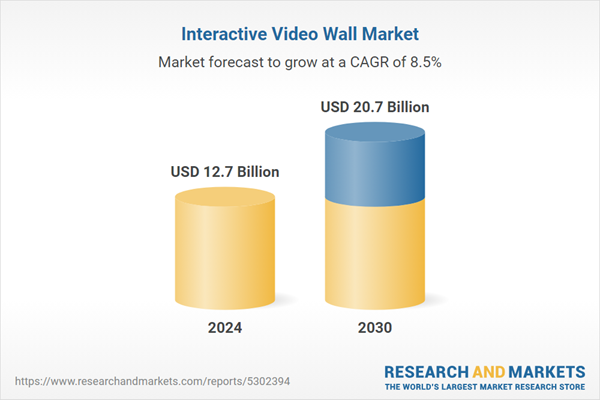Global Interactive Video Wall Market - Key Trends & Growth Drivers Summarized
Why Are Interactive Video Walls Essential for Modern Visual Communication?
Interactive video walls have become crucial tools for organizations seeking to enhance their visual communication and engagement strategies. But what exactly makes these video walls so important in today's digital landscape? An interactive video wall is a large display system composed of multiple screens that work together to create a cohesive visual experience. These systems allow users to interact with content using touch gestures or motion tracking, providing an immersive and engaging way to present information. Interactive video walls are commonly used in various settings, including corporate environments, retail spaces, educational institutions, and entertainment venues.The demand for interactive video walls has surged as businesses recognize the importance of engaging their audiences in an increasingly competitive environment. Organizations are leveraging these systems to create captivating displays that enhance presentations, promote products, and communicate messages more effectively. In retail, for instance, interactive video walls can draw customers' attention and enhance their shopping experience by showcasing promotions and product information. In corporate settings, these systems facilitate collaboration and communication during meetings and presentations. As the need for effective visual communication continues to grow, interactive video walls are becoming integral to organizations' strategies to capture attention and convey messages.
How Are Technological Advancements Elevating the Capabilities of Interactive Video Walls?
The interactive video wall market has witnessed significant technological advancements that have enhanced the functionality and usability of these systems. But what are the key innovations driving these developments? One of the most impactful advancements is the integration of high-resolution displays and improved video processing technologies. Modern interactive video walls utilize ultra-high-definition (UHD) displays that provide sharper images and vibrant colors, enhancing the overall viewing experience. These advancements allow organizations to present detailed graphics and videos with greater clarity, making the content more engaging for viewers.Another critical innovation is the development of more intuitive interactive interfaces and software solutions. Advances in touch technology, such as multi-touch capabilities and gesture recognition, enable users to interact with the content more naturally and intuitively. Additionally, software platforms designed for content management and collaboration are becoming more sophisticated, allowing users to create and manage interactive content easily. This ease of use enhances the appeal of interactive video walls, making them accessible to a broader range of organizations and applications.
The growing emphasis on connectivity and integration with other digital systems is also shaping the development of interactive video walls. Modern systems often come equipped with features that allow seamless integration with various devices, including smartphones, tablets, and computers. This capability enables users to share content effortlessly and enhances the collaborative potential of interactive video walls. As organizations seek to enhance their digital ecosystems, the ability to integrate interactive video walls with other technologies is driving demand for these systems.
What Market Trends Are Driving the Adoption of Interactive Video Walls Across Various Sectors?
Several key market trends are shaping the adoption of interactive video walls across various sectors, reflecting the evolving needs of organizations and consumers. One of the most prominent trends is the increasing focus on customer engagement and experience in retail environments. As competition intensifies, retailers are looking for innovative ways to capture customers' attention and create memorable shopping experiences. Interactive video walls allow retailers to showcase products dynamically, provide interactive displays, and deliver personalized content that resonates with consumers. This trend is driving the demand for interactive video walls in retail spaces, as businesses seek to enhance customer interactions and drive sales.Another key trend driving the adoption of interactive video walls is the growing emphasis on collaboration and communication in corporate environments. With remote work becoming more prevalent, organizations are investing in technologies that facilitate effective communication and collaboration among team members. Interactive video walls can serve as collaborative tools during meetings, allowing teams to share information visually and engage in real-time discussions. This trend is particularly relevant in sectors such as education and corporate training, where interactive video walls enhance learning and engagement.
The rise of digital signage and advertising is also influencing the adoption of interactive video walls. As businesses seek to differentiate their marketing efforts in crowded markets, interactive video walls provide an innovative way to capture attention and deliver engaging advertisements. These systems allow brands to create interactive campaigns that encourage customer participation and feedback, enhancing brand awareness and customer loyalty. This trend is driving demand for interactive video walls in advertising and marketing applications, as organizations look for ways to create impactful and interactive experiences for their audiences.
What Factors Are Driving the Growth of the Global Interactive Video Wall Market?
The growth in the global interactive video wall market is driven by several factors, including the increasing demand for engaging visual communication, advancements in technology, and the rising focus on customer experience. One of the primary growth drivers is the rapid expansion of digital signage across various industries. As organizations recognize the importance of visually communicating their messages, the demand for interactive video walls that provide immersive experiences is on the rise. This trend is particularly strong in sectors such as retail, hospitality, and entertainment, where visual engagement plays a critical role in attracting and retaining customers.Another key growth driver is the ongoing advancement of technology that enhances the capabilities of interactive video walls. Innovations in display technology, touch interactivity, and software solutions are enabling manufacturers to develop more sophisticated and user-friendly systems. As organizations seek to leverage these advancements to improve their visual communication strategies, the demand for advanced interactive video walls is expected to rise. Additionally, the increasing availability of cloud-based content management solutions allows businesses to manage their interactive displays more efficiently, further driving market growth.
The global interactive video wall market is also benefiting from the rising emphasis on experiential marketing and immersive experiences. As brands strive to create memorable interactions with their customers, interactive video walls are becoming essential tools for delivering engaging content. Organizations are increasingly incorporating these systems into their marketing strategies to create interactive experiences that resonate with audiences. This focus on experiential marketing is driving demand for interactive video walls, as companies seek to enhance their brand presence and customer engagement.
With ongoing advancements in technology, the increasing demand for engaging visual communication, and the rising focus on customer experience, the global interactive video wall market is poised for sustained growth. The dynamic interplay of technological innovation, market demand, and evolving consumer preferences is set to shape the future of the market, offering businesses new opportunities to enhance their visual communication capabilities, optimize performance, and drive revenue growth. As companies continue to prioritize effective interactive video wall solutions as part of their overall marketing and communication strategies, these systems will remain essential tools for achieving success in the competitive landscape.
Report Scope
The report analyzes the Interactive Video Wall market, presented in terms of market value (US$ Thousand). The analysis covers the key segments and geographic regions outlined below.- Segments: Layout (Standard, Custom); Display (LED, LCD, Other Displays); End-Use (Retail, Hospitality, Museum, Corporate, Transportation, Other End-Uses).
- Geographic Regions/Countries:World; United States; Canada; Japan; China; Europe (France; Germany; Italy; United Kingdom; and Rest of Europe); Asia-Pacific; Rest of World.
Regional Analysis
Gain insights into the U.S. market, valued at $3.4 Billion in 2024, and China, forecasted to grow at an impressive 8% CAGR to reach $3.2 Billion by 2030. Discover growth trends in other key regions, including Japan, Canada, Germany, and the Asia-Pacific.Why You Should Buy This Report:
- Detailed Market Analysis: Access a thorough analysis of the Global Interactive Video Wall Market, covering all major geographic regions and market segments.
- Competitive Insights: Get an overview of the competitive landscape, including the market presence of major players across different geographies.
- Future Trends and Drivers: Understand the key trends and drivers shaping the future of the Global Interactive Video Wall Market.
- Actionable Insights: Benefit from actionable insights that can help you identify new revenue opportunities and make strategic business decisions.
Key Questions Answered:
- How is the Global Interactive Video Wall Market expected to evolve by 2030?
- What are the main drivers and restraints affecting the market?
- Which market segments will grow the most over the forecast period?
- How will market shares for different regions and segments change by 2030?
- Who are the leading players in the market, and what are their prospects?
Report Features:
- Comprehensive Market Data: Independent analysis of annual sales and market forecasts in US$ Million from 2024 to 2030.
- In-Depth Regional Analysis: Detailed insights into key markets, including the U.S., China, Japan, Canada, Europe, Asia-Pacific, Latin America, Middle East, and Africa.
- Company Profiles: Coverage of players such as Adflow Networks, AU Optronics Corp, LG Display Co. Ltd., Navori SA, NEC Display Solutions and more.
- Complimentary Updates: Receive free report updates for one year to keep you informed of the latest market developments.
Some of the 33 companies featured in this Interactive Video Wall market report include:
- Adflow Networks
- AU Optronics Corp
- LG Display Co. Ltd.
- Navori SA
- NEC Display Solutions
- Omnivex Corporation
- Panasonic Corporation
- Philips N.V.
- Samsung Electronics Co. Ltd.
- Sony Corporation
This edition integrates the latest global trade and economic shifts into comprehensive market analysis. Key updates include:
- Tariff and Trade Impact: Insights into global tariff negotiations across 180+ countries, with analysis of supply chain turbulence, sourcing disruptions, and geographic realignment. Special focus on 2025 as a pivotal year for trade tensions, including updated perspectives on the Trump-era tariffs.
- Adjusted Forecasts and Analytics: Revised global and regional market forecasts through 2030, incorporating tariff effects, economic uncertainty, and structural changes in globalization. Includes historical analysis from 2015 to 2023.
- Strategic Market Dynamics: Evaluation of revised market prospects, regional outlooks, and key economic indicators such as population and urbanization trends.
- Innovation & Technology Trends: Latest developments in product and process innovation, emerging technologies, and key industry drivers shaping the competitive landscape.
- Competitive Intelligence: Updated global market share estimates for 2025, competitive positioning of major players (Strong/Active/Niche/Trivial), and refined focus on leading global brands and core players.
- Expert Insight & Commentary: Strategic analysis from economists, trade experts, and domain specialists to contextualize market shifts and identify emerging opportunities.
Table of Contents
Companies Mentioned (Partial List)
A selection of companies mentioned in this report includes, but is not limited to:
- Adflow Networks
- AU Optronics Corp
- LG Display Co. Ltd.
- Navori SA
- NEC Display Solutions
- Omnivex Corporation
- Panasonic Corporation
- Philips N.V.
- Samsung Electronics Co. Ltd.
- Sony Corporation
Table Information
| Report Attribute | Details |
|---|---|
| No. of Pages | 222 |
| Published | January 2026 |
| Forecast Period | 2024 - 2030 |
| Estimated Market Value ( USD | $ 12.7 Billion |
| Forecasted Market Value ( USD | $ 20.7 Billion |
| Compound Annual Growth Rate | 8.5% |
| Regions Covered | Global |









